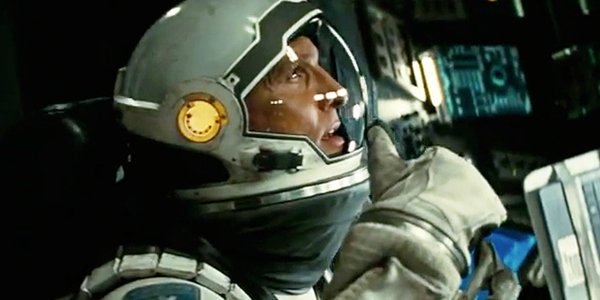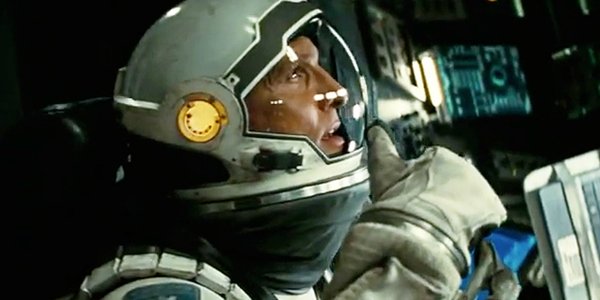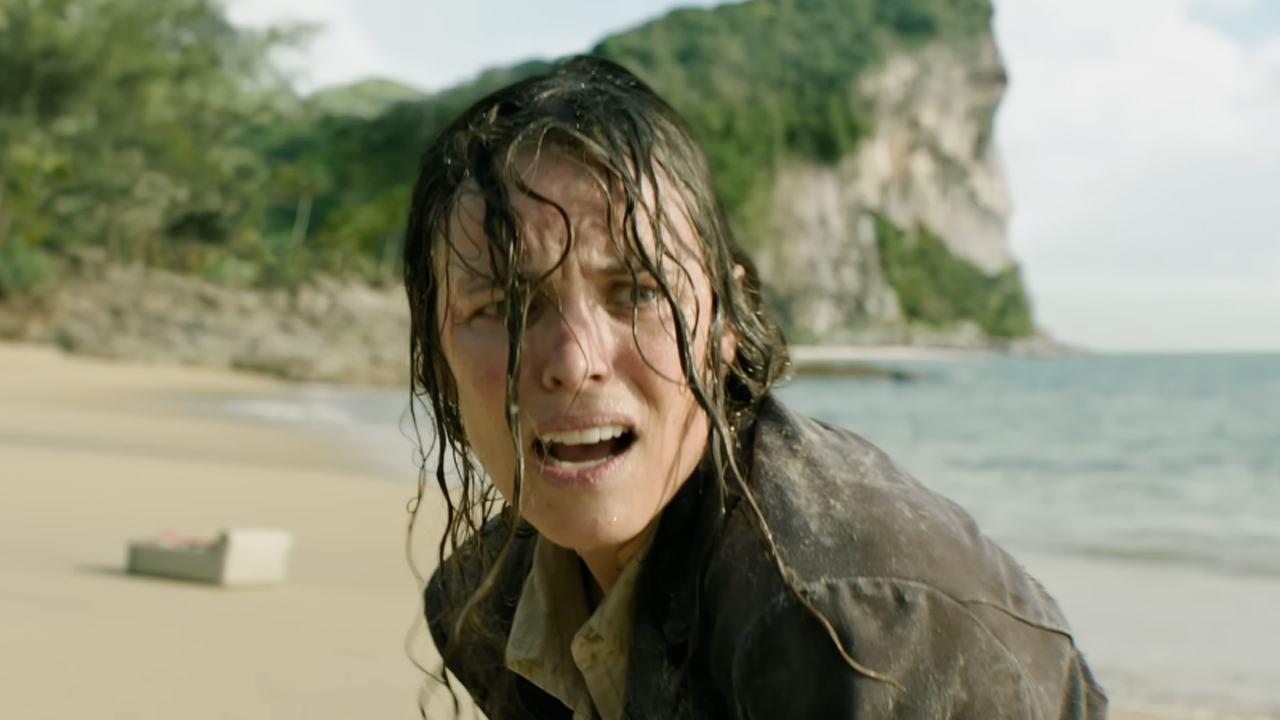Why Interstellar's Ending Doesn't Mean What You Think It Means

I've been vocal about my opinions on Christopher Nolan's Interstellar. I mapped out my issues with the film in a feature you can skim here. But I've also spent a lot of time thinking about what happens on screen in Interstellar, trying to figure out if there are explanations for the events of Nolan's third act. I've come up with a theory, one that trades in massive spoilers. Read on, if you're intrigued.
Ready? I think Matthew McConaughey's character, Cooper, dies after he ejects out of his craft and floats off into outer space. And I think the events that take place after that ejection -- including the Morse Code Bookshelf and the "reunion" with Future Murph (Ellen Burstyn) -- are nothing more than manifestations of a death dream... images that are flashing before his eyes as he's dying, or after he's already dead.
Listen, I hate the "he was dead the whole time" theory that's often applied to movies that make little sense on screen. In the wake of M. Night Shyamalan's The Sixth Sense, a small wave of movies tried to hide themselves behind the narrative sleight of hand, stating in the closing minutes of a questionable movie that the protagonist had died earlier -- negating a chunk of what you just watched. Some of these movies used the plot device to great effect. Others fell back on lazy trickery. (I can't give you examples of either, because to reveal which movies dabbled in the screenplay sorcery would be to deflate their balloons.)
Christopher Nolan doesn't officially reveal Cooper's fate, at least not in the way that a magician would reveal the secret of his greatest trick. Or, since we're discussing Nolan, we should call it the prestige. Instead, he leaves it up to our interpretation. And the reason I come back to this idea of Cooper's death is a conversation the astronaut has with the mysterious Dr. Mann (Matt Damon) on Planet #2. To refresh your memory, Mann is the astronaut who sent a signal from a "frozen" planet indicating to scientists on the other side of a wormhole that he had landed on a hospitable chunk of rock. Cooper, Brand (Anne Hathaway) and Romilly (David Gyasi) are planet hopping, following up on potential options when they land on Mann's planet and find him in cryo-sleep. That doesn't last, and soon, Mann has turned on Cooper and his crew, hellbent on taking over their ship so he can return home.
This involves a lengthy (and fairly ridiculous) fight that even Mike Ryan of ScreenCrush labeled as out of place and more prone to pop up in a brainless summer blockbuster. But during their interactions, Mann and Cooper have a conversation, which I found intriguing, about the survival instinct that kicks in when you are facing death. Mann asks Cooper what he thinks we see as we are dying. They determine that when a person is dying, they see their children. This human connection prompts us -- mankind -- to fight death, to struggle to stay alive longer. We want to see our kids again (a dominant theme in Interstellar).
There can be multiple reasons behind this conversation, but I believe one of them is to set up Cooper's eventual fate. After he ejects from the small craft and, let's say, dies, his next sequence places him into the mysterious "Tesseract" -- the fifth-dimension portal that allows him to communicate with Murph along any point of her timeline. It's at this moment that Interstellar -- a film that already played fast and loose with science -- completely tosses rationality to the wind and just plunges down its silliest paths. (Morse Code Bookshelf!)
But what if the Tesseract didn't actually happen? What if this was all conjured in the mind of a dying Cooper? Somehow, thinking this allows me to swallow that whole sequence, as well as the abrupt ending of Nolan's feature. Cooper's "reunion" with Murph has several visual cues that call back to the life he led with his daughter -- most notably the baseball field outside his window. This was, after all, the place where he took Murph as a reward for her suspension from school. A dying parent might drift back to happy memories of the baseball field, while also wondering what Murph would look like as an older woman.
Your Daily Blend of Entertainment News
And because Cooper is ordered to go retrieve Anne Hathaway's Amelia from Planet #3, even though she should have been there for years and would have been dead also, I'm assuming she has died as well. He's dead. She's dead. They're all dead.

Of course, the "He died" argument can be poked and prodded until it falls apart. Some, like David Crow at Den of Geek, prefer to take a straight and literal translation of Christopher Nolan's Interstellar -- even though doing so means subscribing to an incredibly convoluted resolution that involves future versions of humanity mastering the concepts of time travel, and fifth-dimensional communication methods. (Again, Morse Code Bookshelf!)
This opens the debate of who "They" are in Christopher Nolan's film. Cooper, Brand and the NASA elite are following clues left by "They," which we are initially led to believe are extraterrestrials sending lessons back to our dying planet so we can figure out how to leave it. If you accept the "tesseract" scenario as fact, though, then Cooper is actually receiving his messages from an advanced form of human being who has evolved to the point that "They" can control time and space -- allowing them to communicate forward, backwards and sideways. In their own analysis of the film, ScreenRant almost points to the entrance of the "Tesseract" as the moment where you either choose the path that says Cooper died, or you say that you believe in the possibility of a futuristic society, and the ending of Interstellar as Nolan might have presented it. Ben Kendrick writes of the near-end of Interstellar:
When Cooper sacrifices himself to ensure Plan B, he is caught in the black hole's gravitational pull but, instead of dying, ejects from his ship -- landing, as previously mentioned, inside The Tesseract (aka the wormhole's gravitational singularity). A place where the laws of space and time become infinite.
"Instead of dying." There's the rub. If you want to believe that Cooper somehow survived the ejection from his craft (when the gravitational pull of the black hole should have torn him to shreds), then seeing the character enter into a "bookcase" constructed by futuristic beings so he could communicate through time with his daughter at a pivotal juncture and save humanity makes sense. But, in buying into the "He died" theory, a Reddit user named iosonic connects one important dot that I think solidifies my belief in the death theory. Convinced that Cooper's death is what actually allows him to enter into this fifth-dimensional "tesseract," iosonic posits:
Put simply, this interpretation runs as follows. During life, we perceive space-time in four dimensions, with time being an unstoppable, one-directional continuum. After death, we return to our true selves, in a five-dimensional bulk where time has no meaning. Generally, it is impossible to communicate "back" to the living world, since the living are unable to perceive this higher state of our universe. However, and as mentioned explicitly by Dr. Mann's character in the film, the bonds that we form with other living beings are powerful and our instinct for survival pushes us to stay alive a few more moments before death. Thus, when Cooper enters the black hole, his instinct for survival and the unresolved conflict with his daughter push him to sustain a near-death experience, from where he can send a message to his daughter in the living world.
Here. Maybe watching the sequence one more time will help you determine whether Matthew McConaughey dies after ejecting, or really lands in -- ONE MORE TIME -- a Morse Code Bookshelf.
I might be wrong. It's very possible that Cooper survived his mission, and his "sacrifice" eventually saved what was left of the human race because he was able to successfully communicate with his daughter, Murph (Jessica Chastain). But the "He died" theory feels right. It doesn't course correct any of the narrative problems with Interstellar. But a dying father seeing his daughter one last time before passing on to the great beyond makes as much sense as an astronaut getting assistance from a future mankind who helps him communicate using a Morse Code Wristwatch.
Does Christopher Nolan validate one interpretation over the other? Of course not. In an interview with The Daily Beast, the notoriously cryptic filmmaker said of his Interstellar ending:
You're just going to have to go back and see it again. It's there for you to make what you make of it. People do always have radically different interpretations of things I put in there, but I know what I think and I don't like it to have any more validity than the experience you have watching it.
What do you think? Does the "Cooper Died" theory hold any water? Let me have it in the comments section below.

Sean O’Connell is a journalist and CinemaBlend’s Managing Editor. Having been with the site since 2011, Sean interviewed myriad directors, actors and producers, and created ReelBlend, which he proudly cohosts with Jake Hamilton and Kevin McCarthy. And he's the author of RELEASE THE SNYDER CUT, the Spider-Man history book WITH GREAT POWER, and an upcoming book about Bruce Willis.
